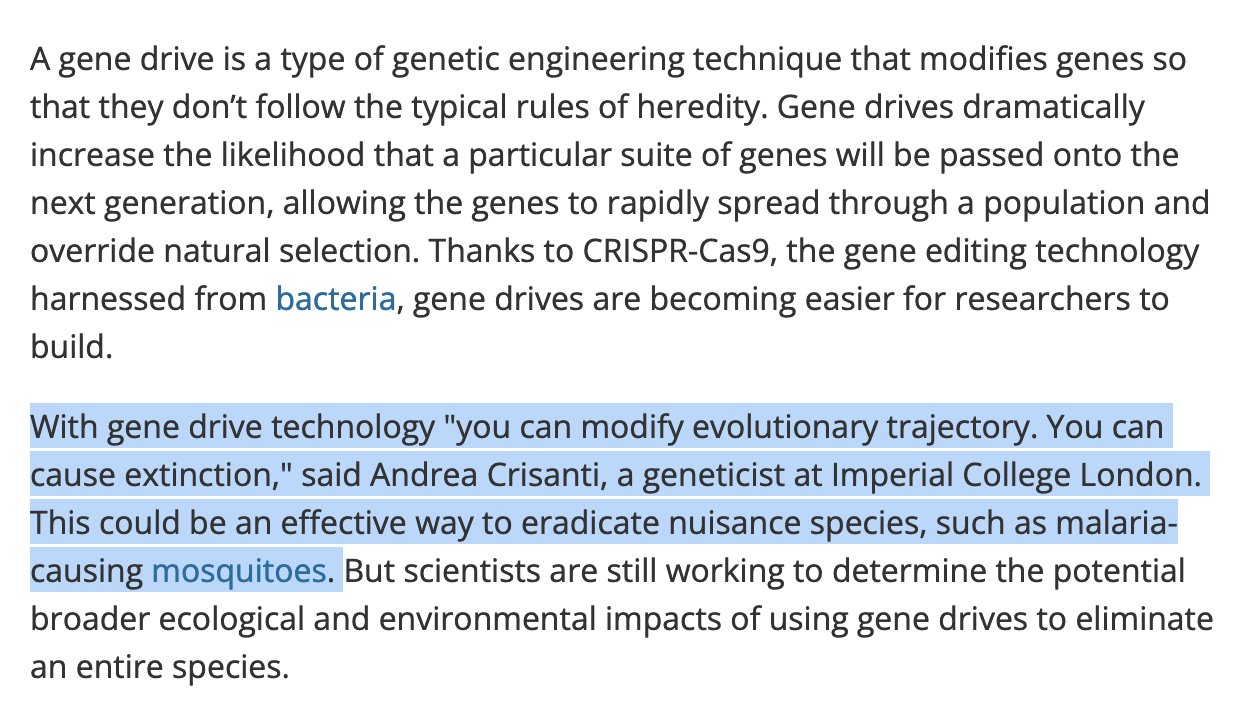In this clip from a video Gates posted to YT in 2022, we get a glimpse of how the WMP operation functions in Colombia.
Bill Gates Provides Millions for the World Mosquito Program. Here’s a Look at How The Org Spends the Money and the Dangers of the Operation (Tweet 1/9)
In this clip from a video Gates posted to YT in 2022, we get a glimpse of how the WMP operation functions in Colombia. pic.twitter.com/8Ww1u1E3eR
— Sense Receptor (@SenseReceptor) June 28, 2023
The WMP operation in Medellín breeds mosquitoes purposefully infected with the bacteria Wolbachia and then releases them “across the country to breed with wild mosquitoes that can carry dengue and other viruses threatening to sicken and kill the population of Colombia.”
The Wolbachia bacteria, which is found in 50% of all the insect species on Earth, affects how the mosquitoes reproduce.
This WMP video notes that if a male mosquito infected with Wolbachia mates with an uninfected female, her eggs won’t hatch; if a male without the bacteria mates with a female who has it, then her offspring will hatch and they’ll all have it; and if both the male and female have Wolbachia, then all of the offspring will also hatch and have Wolbachia.
Obviously the result of this interbreeding is, ultimately, a revamped community of mosquitoes replete with a Wolbachia infection in every single member.
The Wolbachia bacteria, which is found in 50% of all the insect species on Earth, affects how the mosquitoes reproduce.
This WMP video notes that if a male mosquito infected with Wolbachia mates with an uninfected female, her eggs won’t hatch; if a male without the bacteria… pic.twitter.com/NLWZcvMSmF
— Sense Receptor (@SenseReceptor) June 28, 2023
In a blog post explaining WMP’s efforts(1), Gates highlights a study from Yogyakarta, Indonesia(2) supposedly showing this strategy working to prevent diseases. The study, published in The New England Journal of Medicine, claims to have found a reduction in the number of dengue cases in the city by 77% and dengue hospitalizations by 86%.
Note the study does not appear to address two key points: amount of actual virus in the native mosquito population, and all-cause mortality. (Certainly if there was no decrease in the amount of virus in the native mosquito population studied, then the change in hospitalization rates, etc. would be due to another confounding factor. And if there was no effect on all-cause mortality, why bother with the bacteria-infected mosquitoes at all?)
2. Study: https://nejm.org/doi/full/10.1056/NEJMoa2030243
Note the CDC describes the use of Wolbachia in mosquitoes on its website, but it’s either lying or misinformed regarding its profile of the bacteria. In its description(1), the CDC says Wolbachia “cannot make people or animals (for example, fish, birds, pets) sick.” However, a study in the Compendium: Continuing Education For Veterinarians published in 2010(2), unequivocally states that “Wolbachia [species] are gram-negative bacteria that infect filarial nematodes… and elicit an inflammatory response in cats and dogs.”
1. Page: https://cdc.gov/mosquitoes/mosquito-control/community/emerging-methods/wolbachia.html
2. Study: https://pubmed.ncbi.nlm.nih.gov/20949416/
Even worse, a study published in The Annals of the New York Academy of Sciences in July 2008(1) titled “Wolbachia in the Inflammatory Pathogenesis of Human Filariasis,” notes that “Filarial nematodes cause some of the most debilitating diseases in tropical medicine [but] Recent studies… have implicated the parasites’ endosymbiotic Wolbachia bacteria, rather than the nematode, as the cause of inflammatory-mediated filarial disease.” The study goes on to say “studies suggest that Wolbachia are the principal cause of acute inflammatory filarial disease [in humans].”
Scientists also don’t know how exactly Wolbachia causes infertility. Another study, published in PNAS in October 2021(1), claims that “Many Wolbachia strains manipulate host reproduction, most commonly through cytoplasmic incompatibility (CI),” but that “its mechanisms [of action] remain unknown.”
1. Study: https://pubmed.ncbi.nlm.nih.gov/34620712/
It’s also possible that this technology could be abused. This would be especially problematic in regard to the use of so-called gene drives—or a type of genetic engineering technique that relies on CRISPR technology to modify genes so that they don’t follow the typical rules of heredity(1). Gene drives have been demonstrated to function in mosquito populations already(2).
1. Source:livescience.com/gene-drive.html 2. Source: scientificamerican.com/article/gene-d
According to journalist Jennifer Kahn—featured in this TED Talk—gene drives “are so effective that even an accidental release could change an entire species. And often very quickly.” Khan adds that “a gene drive might not stay confined to… a target species” and says that the technique gives scientists the “ability to change an entire species.”
Khan ends her TED Talk, in part, by asking the question: “Are we Gods now?” To which Bill Gates, as well as many others working on this technology, probably have a disturbing and delusional answer.

CRISPR gene drives allow scientists to change sequences of DNA and guarantee that the resulting edited genetic trait is inherited by future generations, opening up the possibility of altering entire species forever. More than anything, this technology has led to questions: How will this new power affect humanity? What are we going to use it to change? Are we gods now? Join journalist Jennifer Kahn as she ponders these questions and shares a potentially powerful application of gene drives: the development of disease-resistant mosquitoes that could knock out malaria and Zika.


















